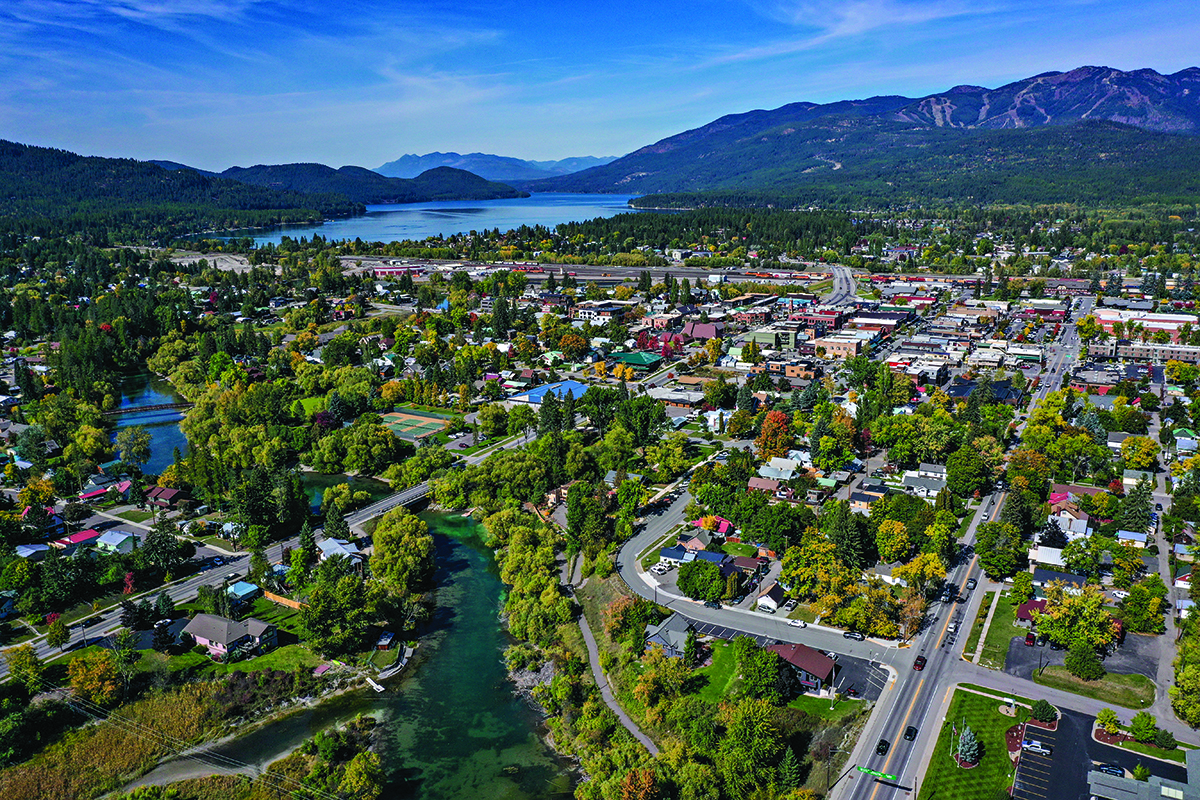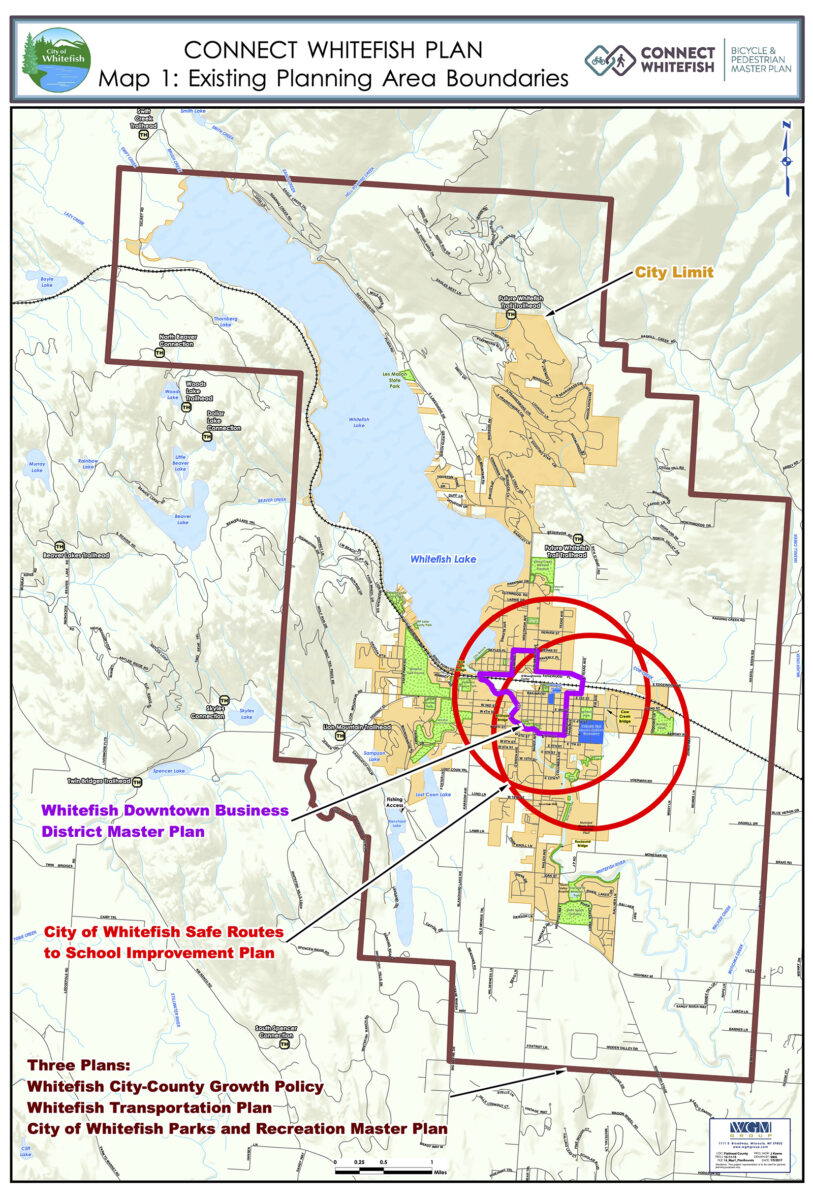Whitefish to Consider Appealing FWP’s Decision Denying River Trail Extension Permit
Citing adverse impacts to the Whitefish River, Montana Fish, Wildlife and Parks rejected the city’s request for a stream permit to extend a walking path, encouraging city officials to consider an alternate concept.
By Tristan Scott
City leaders in Whitefish are considering appealing the state’s denial of an application for a stream permit that would allow the city to plug a prominent hole in the Whitefish River Trail between the Veterans Memorial Bridge on Second Street and the BNSF property near Railway Street.
Citing adverse impacts to the river bed, bank and fishery, Montana Fish, Wildlife and Parks (FWP) denied the permit request on March 20, the final day of its statutory deadline to issue a decision notice. Although the missing section of trail is less than the length of a football field, fisheries biologists determined that its construction would destabilize the streambank and negatively impact aquatic, avian and terrestrial wildlife habitat, among other “adverse impacts to fish and wildlife and their associated habitats.”
Suggesting that an appeal is likely, Whitefish Mayor John Muhlfeld called a special meeting of the city council on March 31 at 5:30 p.m. to discuss the latest development in the ongoing saga to extend the trail system and determine “whether the City will agree to modify its plans or seek arbitration of FWP’s decision.”
As proposed by the city in its request for a Stream Protection Act 124 permit, the section of new trail would be 10 feet wide and 648 feet in length; while 393 feet of the proposed trail augmentation would be built paralleling the Whitefish River on its bank, the remaining 255 feet would require construction of an elevated concrete deck “partially or completely within the channel of the Whitefish River.” That’s the portion of the proposal that FWP deemed out of step with the Montana Stream Protection Act, saying it would destabilize the streambank, lead to further erosion and impact fish and wildlife habitat.
“The proposed elevated concrete surfaced trail would require driving 32 helical piers approximately 90 feet into the streambed to support a welded steel substructure and precast concrete running surface,” according to FWP’s environmental assessment. “The lowest portion of the steel substructure is 1.5 feet above the ordinary high-water elevation. These piers could be the primary cause of negative impacts to bank stability.”
Included among FWP’s decision notice and draft environmental assessment is an alternative proposal that FWP officials said would mitigate the impacts they identified in their review.
“To eliminate or minimize impacts to the Whitefish River’s bed and banks, FWP recommends the applicant pursue a design that avoids permanent and intensive infrastructure below the ordinary high-water mark,” according to the decision notice by Dave Landstrom, FWP’s acting supervisor for Region One.

FWP included a rendering of a trail design that “minimizes impacts and accomplishes the applicant’s vision of a connected, ADA friendly system.”
“At the very least, we can start thinking about and discussing different solutions to complete the Whitefish River Trail, recognizing its importance to the community,” according to the letter from Adam Strainer, the state’s fisheries administrator.
Whether or not the city opts to pursue those “different solutions” will depend on the outcome of next Monday’s special meeting.
The permit application began coming together last May, when the Whitefish City Council directed city staff to apply for a Montana Stream Protection Act permit to construct a missing section of the Whitefish River Trail near downtown that would connect the existing trail on BNSF Railway property near Railway Street downstream with the existing trail terminus near the Veterans Memorial Bridge on Second Street. Currently, pedestrians must climb a set of corrugated steel stairs beneath the bridge and continue along Miles Avenue to connect to the walking path.

The proposed trail extension would cross two private properties and extend into the Whitefish River within the riverbed and the ordinary high-water mark.
The City’s Capital Improvements Programs Report (Fiscal Years 2024-2028) estimates the cost of the proposed project to be $2.1 million.
According to FWP’s analysis, there are already signs of instability in the area of the proposed trail extension, including active erosion at the downstream Riverbend Condominiums. “Increasing rates of erosion could increase the likelihood of a more substantial bank failure such as slumping. The stability of the Riverbend Condominiums is dependent upon the riverbank that supports them,” the analysis states.
Acknowledging the importance of the project, FWP warned that “large scale failure of the bank or condominiums would negatively impact instream habitat upstream, downstream, and at the project site and require substantial work to restore.”
“I applaud your innovative idea to expand the Whitefish River Trail and increase its connectivity throughout your community,” according to the letter from Strainer. “This decision rests on our responsibility to protect and conserve our fisheries and habitat. Our hard-working biologists concluded this project would have long-term adverse impacts to the Whitefish River’s bed, banks, and fishery. Impacts include major modifications to in-stream and bank habitat, and decreased bank stability resulting in erosion. The proposed project footprint alone, including piers, asphalt, and the associated retaining walls, would result in direct loss of significant riparian vegetation and increase erosion. In short, this project would fundamentally change the natural, existing state of fish habitat in the project area.”
Public comment will be taken at the special meeting. Officials encouraged individuals who wish to provide written public comment to send it by email to City Clerk Michelle Howke at [email protected] by 4 p.m. on March 31, prior to the meeting.